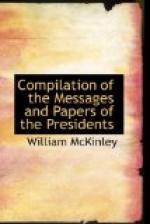Commerce with Foreign Powers:
Consular regulations, 407.
Consular reports on trade and industries,
referred to, 53, 78, 133,
157, 347.
Concord, The, mentioned, 111.
Congress.—Extraordinary session of, convened
by proclamation
of President McKinley, 167.
Referred to, 15.
Connecticut.—Population (1900), 908,420.
Consular Reports, on trade and industries of foreign
powers,
referred to, 157, 347.
Consuls of the United States, active co-operation
in
commerce, 157, 347.
May not act in a fiduciary capacity, 404.
Reports of consular agents, referred to,
19, 42, 53, 157, 347.
Contagious Diseases:
Discussed, 271, 278.
Costa Rica.—Population (1899), 310,000.
Boundary question with Nicaragua, arbitration
of award of,
discussed, 124.
Courts, Consular, regulations for, 264.
Creek Indians:
Treaty with, discussed, 399.
Ratified by proclamation, 399.
Crozler, Captain William, Peace Commissioner at The Hague, 80.
Cuba.—Area 35,994 square miles;
population in 1899 by census, 1,572,797.
In 1901 by act of Congress, autonomous government was granted to take effect in May of that year. It was relinquished by Spain preliminary to negotiations at Paris, December 10, 1898, and was advanced to the position of an independent state. The armed interposition of the United States in its struggle for freedom had the effect of bringing the island into close communication with the United States government. A convention met November 5, 1900, to decide upon a constitution and this was adopted February 21, 1901, according to which the form of government of the island is Republican, with a President, Senor Estrada Palma, Vice-President, Senor Estevez, a Senate, and a House of Representatives. It was upon the adoption of this constitution that the United States decided to pass over the government to the Island of Cuba as soon as the government of that island should agree that it would make no treaty with any foreign power which would endanger its independence; to contract no debt greater than the current revenue would suffice to pay; to grant the United States the right of intervention, and also to give it the right to use its naval stations. These conditions were accepted by Cuba June 12, 1901, and the President and Vice-President of the Republic of Cuba were formally elected February 24, 1902. There are at the present writing some slight evidences of dissatisfaction with the present administration, but they are of the ordinary political nature.
Census ordered, 290.
Constitutional Convention assembled, 145
Creation of offices in, 263, 265.
D.
Dahlberg, Gustav Isak, recommendation for indemnity to, 154.
Dakota.—North and South Dakota created
into a separate Internal
Revenue District, 282.




